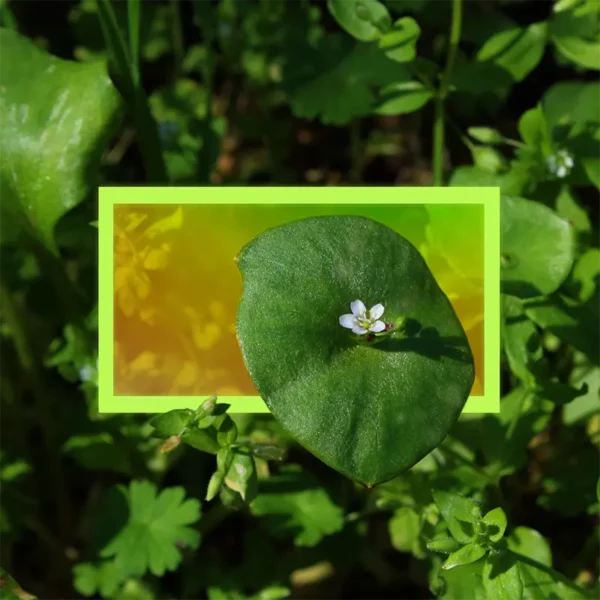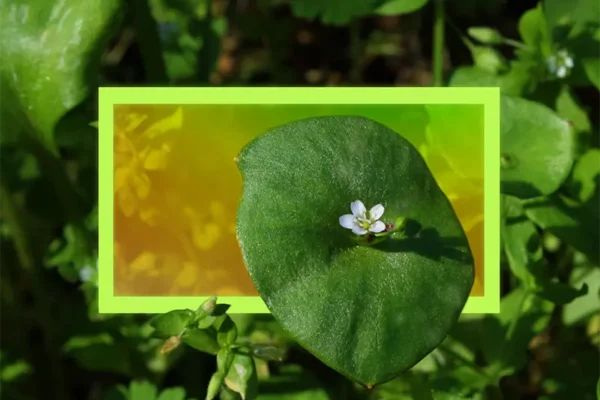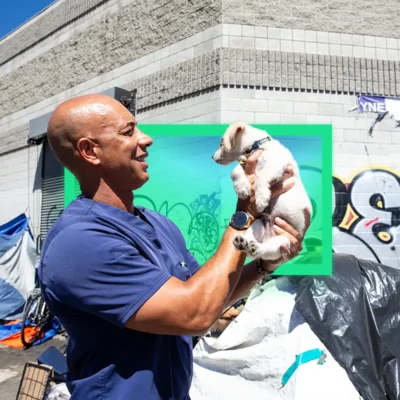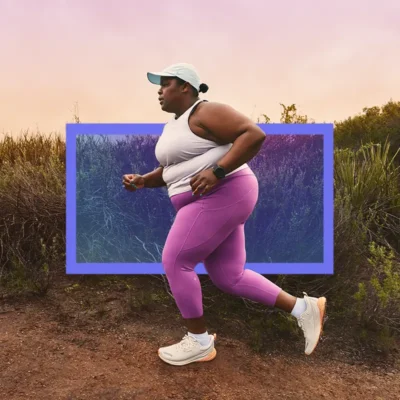From dark times come new discoveries
As the pandemic drags on, Vanessa Hua finds herself in a dark place of panic and doom-scrolling. But that begins to change on one spring day, when she takes a walk outside with her kids – and recognizes a small jewel-green plant growing on the forest floor. Her discovery of wild food foraging helps her tap into a body of shared, ancient knowledge, one that helps her find steadiness within the chaotic present moment.


Table of Contents:
Transcript:
From dark times come new discoveries
VANESSA HUA: Settling deeper into my squat, I’m using muscles that have atrophied while sheltering in place. I pull up handfuls of those dewy and delicate leaves, and stuff them into our backpack. Even that small act invigorates me. As we continue walking, I’m not glancing down at my phone. I’m not studying the alerts or the emails that always deliver more bad news. Instead, I’m looking for plants to identify. For the first time in a long while, I’m not pulled in a million different directions. I’m grounded, literally and metaphorically.
ROHAN GUNATILLAKE: I suspect we can all relate to the gloominess that settles over the author Vanessa Hua in early lockdown – the anxiety and fatigue and tedium of this new and largely-indoor existence.
But then, one day, Vanessa makes a discovery that shifts things in a profound way for her. The discovery is small, delightfully mundane: the pleasing, tender leaves of an edible plant growing near her home. She begins to find solace in the ancient art of foraging.
From there, a deeper kind of groundedness takes root.
In this series, we combine immersive first-person stories, breathtaking music, and mindfulness prompts so that we may see our lives reflected back to us in other people’s stories. And that can lead to improvements in our own inner lives.
From WaitWhat, this is Meditative Story. I’m Rohan, and I’ll be your guide.
The body relaxed. The body breathing. Your senses open. Your mind open. Meeting the world.
HUA: This may sound unbelievable, but it’s true, and it’s miraculous: My family – we’ve put on pants.
Not only that, but we’ve managed to open our front door and venture out into the world. It’s a bright April day here in the hills east of Berkeley, the first in a long, rainy while. Outside, the four of us blink at the strangeness of sunshine and fresh air. Though Northern California is lush and green in spring, the oak leaves are still winter-crunchy beneath our feet. To avoid crowded walking paths, we follow a deer trail that winds through the woods. We make our way down a gentle hill. It is an entirely ordinary walk – and at the same time, it feels entirely unusual. We have not tried anything new or really anything, in so long.
It’s week three of our first pandemic lockdown, and I’m in terrible shape, mentally. Not just me, but the entire world.
I can’t stop doom-scrolling, can’t stop trying to figure out how to keep my family safe, and how to replace lost income. How to search for the clues that might hint at what’s next.
We’re lucky, so very lucky, to have food and shelter and work we can do from home, but I feel like I’m failing everyone in every way, every day.
I’ve got eight-year-old twins in need of amusement, and there’s only so many times I can make a volcano out of baking soda and vinegar, or drop Mentos into diet soda to make it geyser. We live with my mother, who’s in her early 80s, and I’m in a panic that she might fall prey to Covid, or get attacked because she’s a Chinese immigrant.
I stay in my pajamas later and later each day until I finally give up any pretense that I’m ever going to change out of them. I forget to take showers, and I’m greasy-haired, greasy-skinned, red-eyed, and achy. If I manage to drag myself outside, I stuff the pajama bottoms into my knee-high rain boots and throw on a puffy swim jacket. When my husband suggests I get dressed in case I run into a neighbor, I exclaim, “No one can tell what I’m wearing underneath!”
In truth, I don’t quite feel that cavalier on the inside. Whenever I pass anyone on the street, we give each other a wide berth – the new viral normal. I bow my head over my screen, or look away from others. Inwards. The chilly vibe I give off to everyone I pass isn’t who I really am, and the message they are broadcasting to me is just as excruciating. I am forlorn, and they most surely feel the same – all in this awkward dance to protect one another.
But this afternoon, out on these soft hills, still staring at the ground, though there’s no one around to avoid making eye contact with, something happens. In a sunny little clearing, I stumble upon a patch of something green. I squat down. In front of me stands a plant I would have historically considered a weed – trudged past it, trudged through it. I look closer, notice its tiny, delicate white flower and its bright green leafy collar. An unusual name from the recesses of my memory surfaces in my pandemic-fogged brain. Is this Miner’s lettuce?
I text a photo to my naturalist friend to confirm my find. She replies quickly: “yes!”
I grew up here in California, learning in elementary school that the 49ers dined on these very greens, which are high in vitamin C, to prevent scurvy.
The excitement I feel just about rivals the discovery of gold at Sutter’s Mill in 1849. Eureka!
GUNATILLAKE: Let’s imagine being here in this moment of discovery. Enjoy how Vanessa is, full of excitement and energy. Breathe some of it in, and let it lift our spine and brighten our minds.
HUA: I call over my boys, who’ve run ahead through the ankle-deep grasses. “Scurvy causes your gums to bleed, and your teeth to fall out,” I explain, with maximum ghoulishness.
My boys watch as I crouch down and pluck the potential test case, rolling the stem between my fingers, admiring the parasol-shaped leaf. The mineral smell of damp earth rises around me, and the sunshine on my back feels like a vacation. I look down, staring a moment longer at what I’ve picked. What if I’m wrong, and it tastes horrible? What if I’m wrong, and it’s poisonous?
I’ve always wanted to try foraging, with its aura of pioneer independence. It seems so different than my 1980s suburban upbringing, in which my working parents called upon the convenience of every canned and frozen meal to keep us fed: Dinty Moore beef stew! Banquet fried chicken! Gordon’s fish sticks!
I know the freezer case better than the outdoors, even though I’ve camped and hiked all my life. I can seldom remember the names of plants and trees, and certainly couldn’t pick them out of a lineup, let alone remember their uses.
A few years ago, while conducting research for a novel, I’d wandered through botanical gardens in Hong Kong and Beijing, snapping photos of labeled greenery, attempting to fill in my landscapes. It was like using flashcards to memorize facts that I promptly forgot after the test.
I hesitate a moment longer, then chomp down on the Miner’s lettuce. It’s a bit grassy for my taste – grassier than spinach, but not bitter like arugula, not tough like kale. I decide to gather more and try cooking it.
Settling deeper into my squat, I’m using muscles that have atrophied while sheltering in place. I pull up handfuls of those dewy and delicate leaves, and stuff them into our backpack. Even that small act invigorates me.
As we continue walking, I’m not glancing down at my phone, I’m not studying the alerts or the emails that always deliver more bad news. Instead, I’m looking for plants to identify. For the first time in a long while, I’m not pulled in a million different directions. I’m grounded, literally and metaphorically.
Just before the pandemic began, it seemed like I’d hit my career stride. At the time it feels good: I’m finishing my third book, I’m a columnist for my hometown newspaper, and every couple weeks I fly off to a university or conference to teach or speak.
But life feels off kilter. I’m often exhausted, and a couple years earlier had ended up at the cardiologist’s because I suffered shortness of breath, and my heart seemed to skip a beat dozens of times a day. Eventually, my symptoms abate.
The doctor offers no explanation – my heart is functioning normally – but I have my suspicions. My connections to my work, and to my family and friends and to the world feel a mile wide and an inch deep. My attention is disintegrating, my mind’s always elsewhere. When the pandemic arrives it has the bizarre and terrifying power to amplify all that. Covid almost feels designed to rev up our most anxious, churning impulses.
With our freshly foraged Miner’s lettuce, we head home, and that night I stir-fry it for dinner. The greens sizzle and shrink, the air fragrant with garlic and sesame oil – the sort of recipe a Chinese fortune seeker might have conjured for himself in the gold fields. Cooked, it’s silky, darkening to emerald. It tastes like spring. Neither my mother nor my sons are interested in sampling it, but my husband declares it delicious.
It turns out Miner’s lettuce is the gateway drug to foraging. It’s easy to identify, and it’s sprouting up everywhere I look. Everywhere my family looks. How have I never noticed it before?
When we come upon a big patch, one of my sons asks, “Is this your happy place?” We pose for pictures, as if the leafy greens are Half Dome or the Grand Canyon.
“They look like satellite dishes,” he adds, which sparks a discussion about Sputnik, the space race between the Soviet Union and the United States, and the ill-fated cosmonaut mutt, Laika.
I’ve been sleepwalking through my days. Suddenly I’m giving impromptu science and history lessons.
As the American-born daughter of immigrants, I can’t help noticing that foraging provides a familiar form of resourceful thrift. That’s an empowering feeling – a small measure of control when so much feels out of control.
GUNATILLAKE: I recognize this feeling too, do you? During these times, so many of us have looked for anchors we can hold on to. For me I run and cook. What anchors you?
HUA: As I learn the names of plants and their uses, the scenery rearranges itself in my vision and in my memory. My gaze sharpens, in a process known as “breaking the green wall.” I realize I’d had what seemed like a form of face blindness with plants – an inability to recognize or differentiate. What I could not separate, see as individual, I struggled to remember. What once might have been generic prettiness, lumped in my head as wildflowers, becomes specific in name and taste.
Anise-scented wild fennel whose feathery fronds I boil, mince, and toss on pasta.
Wild mustard whose downy leaves I blanch, then stew with lentils. Drooping white blooms of three-cornered leeks, redolent of chives, that I toss into potato soup.
While out foraging with my sons, I pay closer attention to the conversations that I sometimes had listened to with only half an ear. In my fiction writing, I reach for the precise details that fully flesh out my characters, major and minor.
All of this noticing, this seeing – it transforms me, turns me from passive to active. A switch flips inside me. I feel open to the world and its wonders, not braced for its gloom.
I don’t have to go anywhere special. Walks around my neighborhood or just a few miles from home always turn up surprises. I don’t have special tools, either – just a blue fanny pack with lots of zippered pockets into which I can drop my finds. To anyone passing by, I might appear a bit strange – especially if they spot me scaling a tree for plums or rooting in the underbrush for a handful of greens.
My mother is ecstatic when I bring back loquats, what she calls pipa. The golden coins of fruit have the taste of tangy peaches. She remembers them from her childhood in Taiwan, but never found them in the supermarkets here. A taste she thought lost, now recovered.
Looking up and outwards at the world around me, I gain this skill that makes me feel more at home, at a time when we are at home more than ever, but in such an eerie way. Amid the chaos, foraging’s guidelines seem like rules to live by: Don’t be greedy; leave enough for animals, other foragers, and for the plants to propagate; pick in areas away from pollution and pesticides; follow local laws and regulations; look for multiple characteristics to confirm a find; seek advice from a mentor.
As I climb through the hills, my synapses fire in a way that feels alive. Spanish moss veils the branches of the live oaks, and the head-clearing scent of eucalyptus tinges the air. I think about how freedom of movement gets threatened, time and again, though it’s a fundamental right. Later, digging into research, I learn about anti-trespass laws enacted in the South after the Civil War to restrict foraging among freed slaves, who gathered wild foods to sell and eat.
I’m inspired by the resilience of those who have foraged before me. By prehistoric ancestors who hunted and gathered for millennia. By the witchy power of those who possess the medicinal secrets of the forest. By the indigenous and immigrant families who carry on their cultural traditions. The impoverished who search for wild foods to keep from starving. The earlier me felt so disconnected from this history. Now, though, I find this shared lineage reassuring.
The vast majority of what I identify, I leave alone. It’s the equivalent of catch-and-release, the thrill of the hunt without intending to consume. Every stroll outside feels like a game – like a greeting in which I connect with the wonder and sustenance in the world around me.
“Why hello, horsetail! What a lovely day it is, silverpuff!” I all but call out. My despair and uncertainty about the future lifts, and I have only what’s before me.
Yet it also reminds me of the connections we share. The leaves, the stems, the flowers are a map leading me back to the bestower of the names. Hare’s foot, inkcap, mule’s ear, monkeyflower, wake robin, we chant across the centuries.
Every time it seems like we’re nearing the end of the pandemic, the finishing line recedes. Maybe we’ll never get there. Maybe we shouldn’t strive to go “back to normal” after the coronavirus exposed just how off balance everything – and everyone – actually is.
Foraging is more than a hobby – it’s a transformation of the very way I see, of the way I am in the world. Some of the lessons are what I would have expected: Act now. Make use of what you have. Seize the moment, seize what’s in front of you. Opportunities, flourishing one week, may shrivel the next.
But gradually I start to notice a deeper shift in me, one I wouldn’t have predicted. All that doomscrolling I’ve been doing – it feeds my darker fears about life and its fragility. But looking up and around, I realize that I am resilient at my core. Despite everything, I feel called to find what’s beautiful. What’s sustaining. What’s bigger and steadier than whatever the present moment throws at me. I feel a sense of rebirth emerging out of this crisis – an expansiveness that is waiting for me on the other side.
In the days and weeks ahead, the neon vibrancy of spring foliage parches as temperatures rise. After the chickweed dries out, green walnuts and green almonds emerge, and I steep them in vodka to make nutty liqueurs. In the heart of summer, dusky plums and swollen blackberries hang heavy and ripe.
After smoke from summer wildfires clear, I harvest bay laurel nuts, with their notes of coffee and dark chocolate. As winter approaches, I gather pineapple guava the size of hens’ eggs and taste like Starburst – an easy sweetness late in the year.
And when spring returns, the old Miner’s lettuce unfurls again and again. As I emerge into the world in search of those tenacious greens, I do so with a new kind of clarity. From these dark times can come a discovery and renewal capable of sustaining me and those I love.
Rohan’s closing meditation
GUNATILLAKE: Thank you Vanessa for such a delight-full story. Life finds a way.
Water and air and heat, a place to hang on to, and time, and there you are, there is growth.
Vanessa’s initial discovery of the Miner’s lettuce and then that cascading into a love of foraging reminds me quite a bit about how meditation works. Something makes you open up and become ready to see new things, now ready you then see those things. Seeing new things you learn how to make that new level of awareness nourishing, and then the positive feedback loop that comes with that nourishment means that it’s no longer about a one-off eureka moment, you build a habit of being able to access that which enlivens and enriches you.
That might have been a lot so let me say that again in a different, simpler way.
You want to see things differently, you start to do that, you notice how seeing things differently makes things better, you turn that into a habit.
That’s basically how the practice of mindfulness meditation works in general. And riffing off Vanessa’s story, for our little closing meditation together how about we do a mini version of that flow, so you get more of a sense of what I mean.
Vanessa was in the depths of early lockdown, and so that was her call to action – her need to bring freshness to her days and, to be honest, to her mind so she was primed. How about you? Are you primed? There are things you can do to help with which if you’re a long time listener you will be familiar. Softening the body, the face, the hands, the belly. Lifting the spine, the chin, just a touch. Opening the chest, the heart. Inviting the mind to follow. Using the words “open” and “alert” as our intention. So do whatever feels best for you of those now.
Now that we’re a bit more open and bright. What can you notice in your experience? It might be something in the body, or something in the mind. Or something which is a little bit of both. What is here to be noticed and known? Just as the little plant in the urban landscape was for Vanessa.
Great. Whatever it is that is prominent in your mind, in your awareness, can you tune in and be aware of any of its details? If it’s a physical sensation that’s strongest for you right now, what are its boundaries like? Is the sensation hot or cold, tingly or calm? Get interested in its qualities and boundaries.
The same applies if it’s a mental state or thought pattern or mood that is most strong now. Does anything come along with it, maybe commentary or an accompanying sensation. What are the boundaries? Where does the thought or the mood end? Does it have edges? What are they like? Get interested in the details.
Lovely stuff. Now pull back a bit off the gas, and take a moment to reflect on what you saw and what you learnt, no matter how minor it may seem. For example, what happened when you started to look closer? How fluid was what you were paying attention to? How did it feel to bring that closeness of awareness like that? I’m not expecting you to have had any extraordinary revelations, but if there is just a tiny “when I did this, then I was able to see this” kind of thing, really try to remember that. Because that is what is called an insight, and however minor it might seem, as we collect more they become a stream, or in a metaphor better for Vanessa’s story, a field of insights that just keep growing and growing into the inevitable direction of wisdom.
So for me, I noticed an area of tension in my neck, but when I looked closer, it was more like a tingling hot sensation. And I noticed that when my mind zoomed back out, it felt less tense. That’s an insight. And the practice of meditation is our foraging for them whenever we can.
So thank you Vanessa for sharing your story of what can happen when looking and seeing and connecting and being open to transformation.
And thank you. Stay safe and well.





